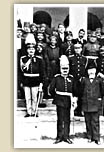|
|
 |
 |
 |
 |
 |
 |
 |
 |
 |
 |
|
At the beginning of the twentieth century, colonial competition and the conflict between the
Great Powers for their geopolitical and economic zones of influence intensified.
At the same time, the Eastern Question was entering its final phase with the disintegration
of the Ottoman Empire and the partition of its territories.
|

A little before the outbreak of the war, the following alliances were formed:
on the one hand Great Britain, France and Russia constituted the countries of the Entente Cordiale and, on
the other hand, Germany, Austia-Hungary and Italy made up the Triple Alliance,
also called the Central Powers.
The pretext for the clash was provided by the assassination of the heir to the throne of Austria,
arch-duke Ferdinand, by a Serbian nationalist in June 1914 in Sarajevo. Austria-Hungary considered this
assassination as an aggressive move of Serbia and the powers of the Entente rushed to support with her.
In 1915 Italy finally fell in with the Entente. The war developed into trench warfare along the western, eastern, Italo-Austrian and Balkan fronts. It was a war of attrition with hundreds of thousands of casualties. In 1917 the United States entered the war on the side of
the Entente, while with the dominance of the Bolsheviks in Russia, the latter surrendered to the Central
Powers and withdrew. The First World War came to an end in 1918 with the total victory
of the powers of the Entente.
The outbreak of the First World War and the Serbian-Austrian crisis in particular brought
Greece to a dilemma, given the terms of mutual support promised in the Greek-Serbian treaty of 1913 in the event of attack by a third power. Generally, the Greeks did not opt
for active participation in the war but instead favoured neutrality (also favourable for Serbia) but at the same time was ready for intervention in the event of a Bulgarian attack.
The western powers also consented to this policy,
|
 |

as they did not wish to impel Bulgaria and the Ottoman Empire into entering the
war on the side of the Central Powers.
This aside, there was unease in Greek foreign policy. On the one hand, Venizelos saw his country yoked to the policy
of the Great Powers, the Entente. This choice was related to three major factors: more general
economic and geopolitical interests in the eastern Mediterranean and the prevalence there
of the British interests, the selection of camp of the two Balkan enemies of Greece,
of Bulgaria and the Ottoman Empire and the estimation that he made concerning the outcome
of the war. On the other hand, King Constantine I had studied in Germany, was an admirer of German social models and was married to Sophia, sister of the German Emperor, Wilhelm. All these
contributed to his pro-German stance, expressed through strict neutrality. This stance was favoured
by German diplomats, given that due to its extended coastline and islands Greece was vulnerable
to attack from the British navy, while the attempt to win over Bulgaria and the
Ottoman Empire by the Central Powers did not favour the immediate entrance of Greece in the
war as their ally.
|
 |
 |
|
